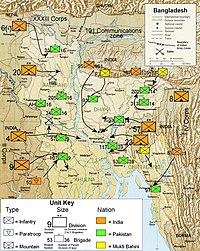After the Awami League won all the East Pakistan seats as well as a majority of the Pakistan's National Assembly in the 1970–71 elections, West Pakistan opened talks with the East on constitutional questions about the division of power between the central government and the provinces, as well as the formation of a national government headed by the Awami League.
The talks proved unsuccessful, however, and on 1 March 1971, Pakistani President Yahya Khan indefinitely postponed the pending National Assembly session, precipitating massive civil disobedience in East Pakistan.[62]
On 2 March 1971, a group of students, led by A S M Abdur Rob, a student leader, raised the new (proposed) flag of Bangladesh under the direction of the Swadhin Bangla Nucleus. They demanded that Sheikh Mujibur Rahman declare the independence of Bangladesh immediately but Mujibur Rahman refused to agree to this demand. Rather, he decided that he would declare his next steps at a public meeting to be held on 7 March.
On 3 March, student leader, Shahjahan Siraj, read the 'Sadhinotar Ishtehar' (Declaration of independence) at Paltan Maidan in front of Bangabandhu Sheikh Mujib at a public gathering under the direction of the Swadhin Bangla Nucleus.[63]
On 7 March, there was a public gathering in Suhrawardy Udyan to hear updates on the ongoing movement from Bangabandhu Sheikh Mujib, the leader of the movement that time. Although he avoided directly referring to independence, as the talks were still underway, he warned his listeners to prepare for any imminent war.[63] The speech is considered a key moment in the war of liberation, and is remembered for the phrase,
-
-
- "Ebarer Shongram Amader Muktir Shongram, Ebarer Shongram Shadhinotar Shongram...."
- "Our struggle this time is a struggle for our freedom, our struggle this time is a struggle for our independence...."
-
Formal Declaration of Independence[edit]
In the early hours of 26 March 1971, a military crackdown by the Pakistan army began. The Bangabandhu Sheikh Mujibur Rahman was arrested and the political leaders dispersed, mostly fleeing to neighbouring India where they organised a provisional government. Before being arrested by the Pakistani Army, Sheikh Mujibur Rahman passed a hand written note which contained the Bangladeshi Declaration of Independence. This note was widely circulated and transmitted by the then East Pakistan Rifles' wireless transmitter. The world press reports from late March 1971 also make sure that Bangladesh's declaration of independence by Bangabandhu was widely reported throughout the world. Bengali Army officer Major Ziaur Rahman captured the Kalurghat Radio Station[64][65] in Chittagong and read the declaration of independence of Bangladesh during the evening hours on 27 March.[66]
The Provisional Government of the People's Republic of Bangladesh was formed on 10 April in Meherpur (later renamed as Mujibnagar, a town adjacent to the Indian border). Sheikh Mujibur Rahman was announced to be the Head of the State. Tajuddin Ahmed became the Prime Minister, Syed Nazrul Islam became the acting President and Khondaker Mostaq Ahmed the Foreign Minister. There the war plan was sketched out with Bangladesh armed forces established and named "Muktifoujo". Later these forces were named "Muktibahini" (freedom fighters). M. A. G. Osmani was appointed as the Chief of the Armed Forces.
For military purposes, Bangladesh was divided into 11 sectors under 11 sector commanders. In addition to these sectors, later in the war, three special forces were formed: Z Force, S Force and K Force. These three forces' names were derived from the initial letters of the commander's name. The training and most of the arms and ammunitions were arranged by the Meherpur government which was supported by India. As fighting grew between the Pakistan Army and the Bengali Mukti Bahini, an estimated ten million Bengalis, mainly Hindus, sought refuge in the Indian states of Assam, Tripura and West Bengal.
The crisis in East Pakistan produced new strains in Pakistan's troubled relations with India. The two nations had fought a war in 1965, mainly in the west, but the pressure of millions of refugees escaping into India in autumn 1971, as well as Pakistani aggression, reignited Indian hostilities with Pakistan. Indian sympathies lay with East Pakistan, and on 3 December 1971, India intervened on the side of the Bangladeshis which led to a short, but violent, two-week war known as the Indo-Pakistani War of 1971.




0 Comments